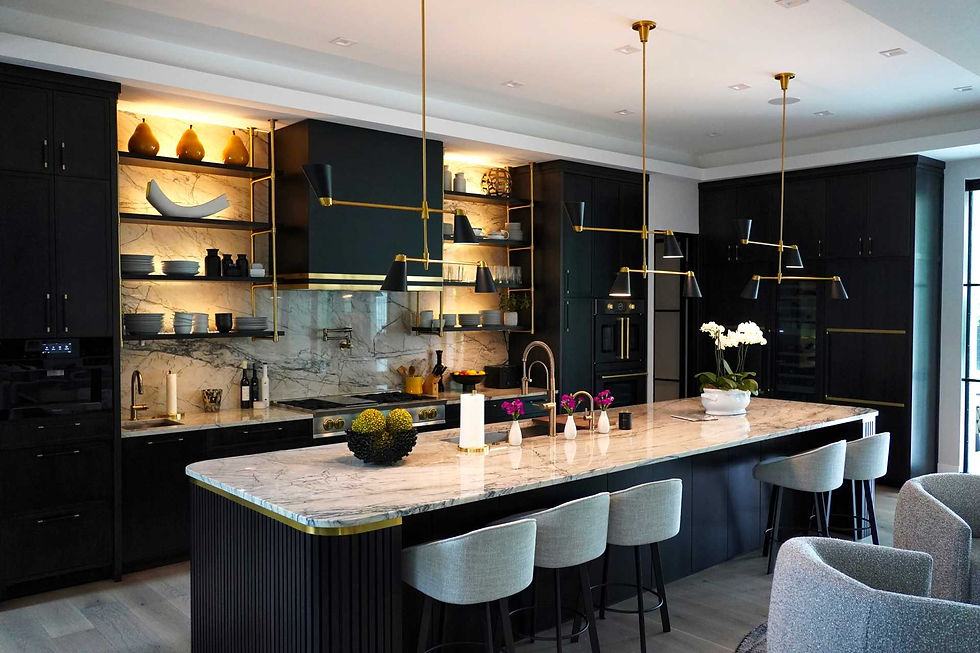The 3 types of countertops and which one is best for your project
- Jack Barron
- Oct 19, 2025
- 3 min read

There is a lot to consider when it comes time to pick a material for your next countertop. Should it be quartz, granite, quartzite, marble, or something else? That depends on a range of considerations.
Things to consider:
First, it is important to consider where you will be installing the countertop, as some stones are not suitable for outdoor use. Second, some stones can require more care and upkeep, including resealing, which may be needed every year. Third, some stones come in a wide array of colors and styles, whereas others only come in a few varieties, which may impact your options depending on your project.
In this post, we will break down the differences between each type of stone, their best uses, and our recommendations.
The main types of countertop materials include:
Natural Stone Countertops (Marble, granite, quartzite, and soapstone)
Engineered Stone Countertops (Quartz)
Solid-Surface Countertops

Natural Stone Countertops
Natural stone countertops include marble, granite, soapstone, quartzite, and limestone. These countertops are durable and can handle the wear and tear of any kitchen, due in part to their heat-resistant nature. Natural stone is durable and resistant to scratches and potential chips. This type is the most common choice for countertops and stays in style. Things to consider with natural stone countertops include that they are porous and must be sealed. Natural stone also needs resealing for upkeep and is more likely to stain.
Pros
More durable
Heat-resistant
Long-lasting
Increases home value
Cons
Porous and in need of sealing
Require maintenance and resealing
Can stain more easily
Types like marble can be sensitive to acids
Variants of Natural Stone
Quartzite is a natural stone made of sandstone. It is easy to clean, resistant to heat, and durable. Yet, the stone is porous and can be prone to stains if it is not sealed. It also has limited color options.
Marble is a natural stone that can vary in color and design, with no two slabs offering the same design. Marble does patina over time as the color darkens slightly. Marble is heat-resistant and is easy to clean. However, marble can be porous and can face wear and tear if it is not sealed.
Granite is a natural stone that also comes in a wide variety of designs. Granite is heat and scratch-resistant and is a hard substance. Yet, granite is porous and can absorb liquids if it is not sealed.
Soapstone is a natural stone that is nonporous and heat-resistant. It also does not require sealing like other natural stone surfaces. Yet, soapstone only comes in a limited range of colors and styles and can scratch or show wear and tear over time.
Engineered Stone Countertops
Engineered stone is a composite material created using resins and natural stone. This type of countertop is simply referred to as quartz because of the large amount of quartz used. Quartz countertops are heat, stain, and scratch-resistant, easy to clean, and do not need sealing or extra maintenance. Engineered stone is non-porous and is impermeable to liquids, air, and other substances. On the other hand, quartz can be damaged by heat exposure and can cost as much as natural stone countertops.
Pros
Heat-resistant
Stain-resistant
Scratch-resistant
Easy to clean
Does not require sealing or extra work
Cons
Heat exposure can cause damage
Costs are similar to natural stones
Limited repair options for cracks and chips
Can only be used inside
May have a less natural look than natural stone
Solid-Surface Countertops
Solid-surface countertops replicate the appearance of natural stone with similar primary and accent colors as well as similar designs. However, these countertops do not have the same cost or maintenance requirements as natural stone.
Pros
Heat-resistant
Stain-resistant
Moisture-resistant
Easy to clean
Can be repaired
Cons
Susceptible to heat
Vulnerable to scratches
Not chemical resistant
Our decision
We recommend engineered and natural stones, particularly engineered quartz and natural quartzite and granite.
Quartz is our go-to stone for most projects. This stone is a stronger, more durable choice for any use indoors. Quartz is perfect for kitchen countertops, bathroom vanities, home bars, and so much more. Quartzite and granite provide the best options for a one-of-a-kind appearance and are best for when you want your space to wow everyone who sees it.
If you have any questions, please reach out to us!








Comments